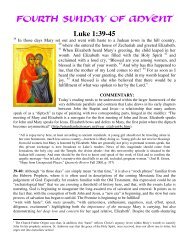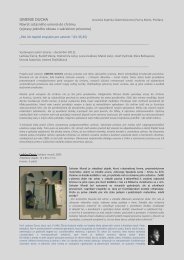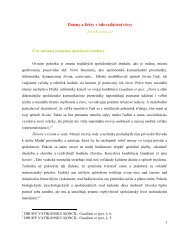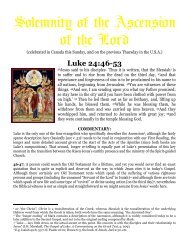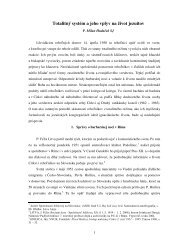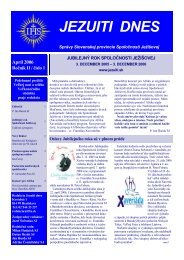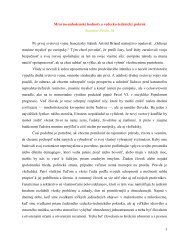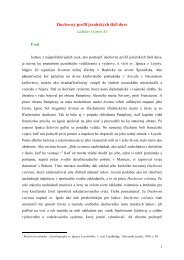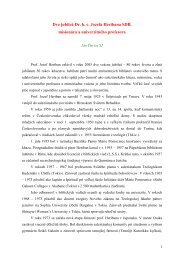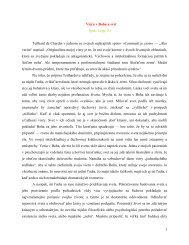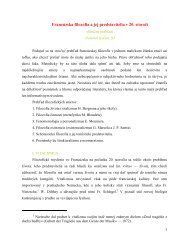Luke 16:19-31 - Jezuiti
Luke 16:19-31 - Jezuiti
Luke 16:19-31 - Jezuiti
You also want an ePaper? Increase the reach of your titles
YUMPU automatically turns print PDFs into web optimized ePapers that Google loves.
24-26: “The rich man still tries to be in charge of things. He begins with a polite address, ‘Father<br />
Abraham,’ as if reminding Abraham of his descent from the patriarch. (Abraham responds by calling him<br />
his child in <strong>16</strong>:25). A part of Abraham’s family, he deserves some consideration … The man’s wish is not<br />
granted. He has already received his share of good things (as though there is a limited supply). Moreover,<br />
the chasm between the rich man in Hades and Lazarus with Abraham is too great to cross. The fact that it<br />
is ‘fixed’ means that it has been established by God.” (Hultgren, p. 113)<br />
The fact that the rich man identifies himself as a “son of Abraham” (i.e. a Jew) is, in and of itself, a<br />
condemnation, since he makes it clear that, although he was of Jewish descent, yet he made no effort to<br />
put the demands of his Jewish faith into practice in his own life.<br />
“The idea of an intermediate state of the soul, release from which may be obtained by intercession of the<br />
saints, is clearly dwelt upon in the Testament of Abraham, where the description is given of a soul which,<br />
because its good and its evil deeds are equal, has to undergo the process of purification while remaining in<br />
a middle state, and on whose behalf Abraham intercedes, the angels joining him in his prayer, whereupon<br />
the soul is admitted into paradise.” (Kaufmann Köhler, “Purgatory”; online at:<br />
www.jewishencyclopedia.com). Some early rabbinic authors suggested that there was the possibility of<br />
post-mortem repentance, and that such a soul would be freed from torment a year after his/her death 4 .<br />
27-28: Once again, the rich man tries to invoke the “family bond” he and his brothers share with<br />
Abraham. However, if his brothers are no more sensitive to the needs of the poor and marginalized than<br />
this rich man was, it is at best a superficial type of relationship, which, in the end, doesn’t really impact<br />
their lives very much. It is somewhat hypocritical—and more than a little cynical—to “play this card” at<br />
this point. Interestingly, once again, the man’s concern remains somewhat selfish—he is interested only in<br />
the needs of his own immediate family, and does not acknowledge in any way his long-term neglect of<br />
Lazarus’ needs. If this man truly had considered himself part of Abraham’s family, then he would<br />
necessarily have understood that Lazarus was, in a very real way, his brother as well, deserving of his<br />
concern and attention. “The rich man’s claim that Abraham is his father is of no effect, for he has not done<br />
the deeds which would have signified repentance from his self-centred, callous way of life.”<br />
(http://montreal.anglican.org/comments/cpr26l.shtml)<br />
29: “Moses and the prophets (referring to the Old Testament books) are clear in their teaching. God’s will<br />
is not difficult to figure out. One is supposed to help the poor and miserable that are nearby. The brothers<br />
are without excuse.” (Hultgren, p. 114)<br />
30: “The rich man … objects to what Abraham has just said. His brothers will certainly repent if someone<br />
goes to them from the dead. That a person from the realm of the dead would visit the brothers seems at<br />
first sight to depend on post-Easter Christian imagery. But the motif is older than Christianity. Various<br />
texts speak of the dead contacting the living, especially through dreams [I Sam 28:6-<strong>19</strong>; II Kings 21:6; Isa<br />
8:<strong>19</strong>; Samuel Lachs provides several ancient Jewish examples in his Rabbinic Commentary on the New<br />
Testament]” (Hultgren, p. 114)<br />
4 “The view of purgatory is still more clearly expressed in rabbinical passages, as in the teaching of the Shammaites: ‘In<br />
the last judgment day there shall be three classes of souls: the righteous shall at once be written down for the life<br />
everlasting; the wicked, for Gehenna; but those whose virtues and sins counterbalance one another shall go down to<br />
Gehenna and float up and down until they rise purified; for of them it is said: I will bring the third part into the fire<br />
and refine them as silver is refined, and try them as gold is tried' [Zech. xiii. 9.]; also, He [the Lord] bringeth down to<br />
Sheol and bringeth up again’.’ (I Sam. ii. 6) … Regarding the time which purgatory lasts, the accepted opinion of Rabbi<br />
Akiba is twelve months; according to Rabbi Johanan ben-Nuri, it is only forty-nine days. Both opinions are based upon<br />
Isa. lxvi. 23-24: From one new moon to another and from one Sabbath to another shall all flesh come to worship<br />
before Me, and they shall go forth and look upon the carcasses of the men that have transgressed against Me; for<br />
their worm shall not die, neither shall their fire be quenched; the former interpreting the words "from one new moon<br />
to another" to signify all the months of a year; the latter interpreting the words ‘from one Sabbath to another,’ in<br />
accordance with Lev. xxiii. 15-<strong>16</strong>, to signify seven weeks.” (www.jewishencyclopedia.com)



